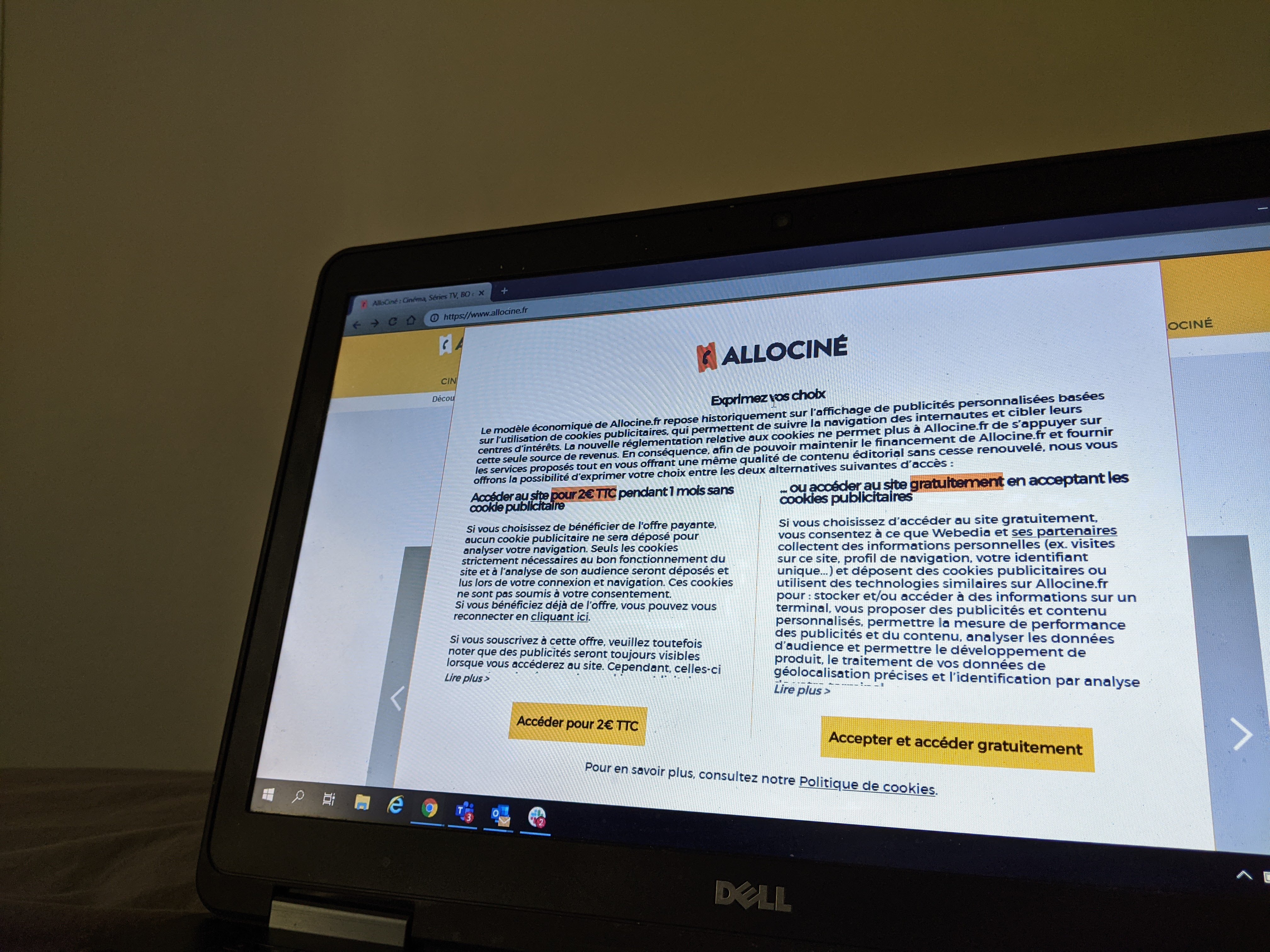“Express your choices.
»The message is displayed in large format when you arrive on AlloCiné for the first time.
The visitor has two options: pay two euros or accept advertising cookies.
The dilemma is the same on the other Webedia group sites including Jeuxvideo.com, Pure People, the 750g recipe site or the Overblog platform.
At Marmiton, it's the same thing: either we pay a monthly subscription, or we accept advertising cookies.
The request for consent for cookies is not new: it is governed by the General Data Protection Regulation (GDPR), a European text that came into force in 2018 to protect the personal data of European Internet users.
Since then, everyone has been systematically questioned: “Do you accept cookies?
But, since April 1, the GDPR has entered a new era in France: the user must be able to refuse cookies as simply as accepting them.
Cookies are essential for the functioning of the Internet: they are small files, stored on the user's computer, which allow him to be identified.
It is this, for example, which allows you to stay connected to your Facebook account without always having to reconnect, or which helps Parisians to know what are their most read articles.
They are also cookies which allow to have advertising linked to his previous navigation: a user has sought to buy a house, he will advertise for real estate platforms or apartment hunters ... "It is which makes it possible to have permanent publicity, ”notes the Parisian Julien Smadja, lawyer at DJS Avocats, specialist in GDPR.
Cookies refused by default
Directives from the National Commission for Informatics and Freedoms (Cnil), on October 1, 2020, invited websites to comply with new rules.
The administration announced at the same time controls, from April 1, 2021. It is a disruption: “Initially, we were in the soft
opt-in
, that is to say that cookies were in fact accepted. if we did not refuse them.
From now on, they are refused, unless they are accepted, ”explains Julien Smadja.
Another change - which explains the appearance of the "I do not accept" button -: we must be able to refuse cookies as easily as when we accept them.
If the publishers have all waited for the CNIL deadline to apply this new rule, it is because the consequences are harmful for them.
“70% of advertising is programmatic, bought at auction without deciding on which site it will be broadcast,” explains Emmanuel Parody, secretary general of Geste, which brings together a large majority of publishers.
That is to say that advertisers buy a target - 25-34 year olds, who live in Strasbourg and who want to buy a car, for example - to display their advertisements only to this target, wherever the insert is.
"Without a cookie, such advertising is not possible and the publisher switches to non-targeted advertising ..." which brings in 50% less ", notes Emmanuel Parody.
Money or cookies
The decision to allow the refusal of cookies against a subscription, implemented by the Webedia and Marmiton group, is not isolated.
The female site Aufeminin (Groupe TF 1), the one specializing in video games Gamekult (also at TF 1), several others from the Prisma group (Capital, Géo, Cuisine Actuelle, etc.) offer the same alternative.
"The publisher must be able to say no in the same way as the user: we cannot continue to circulate on a website by refusing cookies while advertising revenue is halved", defends Emmanuel Parody.
The CNIL will have to decide on the legality of such a system.
Should we expect, tomorrow, to see other sites offering paid access without cookies?
“It will become more democratic,” believes Julien Smadja.
It could go very quickly if publishers see their revenues plummet in the coming weeks.
Google seeks to create a web without cookies.
Publishers try to collect data (you are increasingly asked to create an account) to generate data in order to be able to target without depending on other providers.
Emmanuel Parody wonders: "It may no longer be possible to consider free media?
"















